Tags
AI, Conferences, CPD, Edinburgh, Interpreting, ITI, ITI Conference, Networking, Professional translator, Translation

I’m en route home from my 7th ITI Conference, this time in the beautiful city of Edinburgh, and thought I might as well make the most of a quiet train, a forward-facing seat, a table all to myself, a plug socket for my elderly laptop, and a long journey ahead of me to write up my take on yet another fabulous event.
ITI Conferences are always non-negotiable for me, the very best of the bunch in my experience. I’ve been attending since Birmingham in 2011, although I did go to a joint ITI/CIoL/ProZ event in London in 2008 before I was a member, which was also very useful and actually galvanised me into joining. I have Nick Rosenthal (who introduced Day 2 of this latest event) to thank for that: in a Q&A session, someone asked about his criteria for choosing a freelance translator. He replied that they would have to be an ITI member; I initially bridled, but his words struck a nerve and I realised that, while I might consider myself a good translator, what proof did I have? Fast forward 15 years and ITI conferences are definitely an opportunity for reconnecting with my tribe.
I spent 9 years living in Scotland, albeit in Helensburgh on the West Coast, between 1994 and 2003, when my boys were small, and I relished the opportunity to return to Edinburgh and play the tourist in this glorious city. When we lived up here, we used to visit for the National Squash Centre at Heriot-Watt University, as my youngest was on the national squash squad, I attended ScotNet events in the city, and we even came across to buy a new, all-singing, all-dancing multimedia computer from John Lewis in 1995 when email and the internet were just starting to become a thing….

But back to the conference. I have to confess that I wasn’t overly impressed with the programme before the event: far too much emphasis on AI in my view, but I know I’m in the lucky position of being at the tail end of my career and have established direct clients who continue to send me lots of interesting translations. Younger colleagues and newbies are certainly right to be concerned about the threats posed by the new technology on the block, although it feels to me that the tide is already turning and clients are realising that machine translation and AI are not all they are cracked up to be. That certainly seemed to be the gist of the presentations I did watch on this subject.
My highlights tended to cover other themes far more relevant to this old-timer (although I do cede 10 years to the inestimable Chris Durban, who mentioned in her session that she has been translating for 50 years this year, whereas I can only claim 40…). First on my list was Ken Paver’s great talk on diversification. Ken and I go back a long way as we both started out in the same nuclear company in the 1980s, although I’d left on maternity leave by the time Ken arrived. As an experienced nuclear interpreter and trainer, it was fascinating to hear what other areas he has diversified into and how his strategies can be adapted by freelancers in other areas too, even if branching out (sorry) into tree surgery might be a step too far for most of us. His message boiled down to the fact that, as translators or interpreters, our main aim is to communicate and there are numerous ways we can adapt the skills we have to communicate messages for clients’ gain.
Nathaniel Elcock (another former nuclear interpreter – I’m not biased, I promise!) gave an extremely engaging presentation on negotiation skills too. Translators are notoriously bad at negotiating and it was good to learn some strategies for negotiating effectively with clients within the ZOPA (zone of possible agreement). The main takeaways were to make sure you’re dealing with someone who has the authority to be flexible AND that it’s not always a good idea to make the first offer when you’re selling, be it a product or a service. He cited the example of some app developers who were selling their product and had expected to get a few thousand pounds each. They had the foresight to ask the potential buyer what figure he was thinking of first – and were pleasantly surprised when he mooted a figure nearer the million mark. They even had the composure to say that was a little on the low side and ended up with a much higher final figure. Food for thought indeed. Of course, dealing with agencies is always going to be more restrictive, as they may have alternative options if quality or a niche specialism aren’t an issue, or you’re dealing with a PM with no room to manoeuvre.
Tim Gutteridge’s presentation on translating swearwords was also highly entertaining, even though Spanish isn’t one of my source languages and I rarely swear myself – clearly a good thing I’m not a literary translator! Fascinating to learn the number of things you can ‘shit on’ in Spanish – it reminded me of my younger son’s Spanish penfriend at the age of 14 or so asking “What is this shit?” when presented with one of my vegetable-laden dishes at dinner as he claimed only to eat meat! (It turned out later, when I visited his family in Spain, that his mother is a wonderful cook and vegetables do indeed feature on her menus. When he was my son’s best man many years down the line, I did check that he would moderate his language in his speech so as not to offend visiting grandparents…..).
It was also immensely instructive to hear how AI engines cope with requests to translate these tricky ‘rude’ phrases – often by primly saying they can’t offer a solution as it would infringe usage rules (!) or proposing solutions that are far more literal than the creative human suggestions Tim came up with, or just completely inappropriate. I really do recommend you catch up with this one online to enjoy it in its full, unadulterated glory.
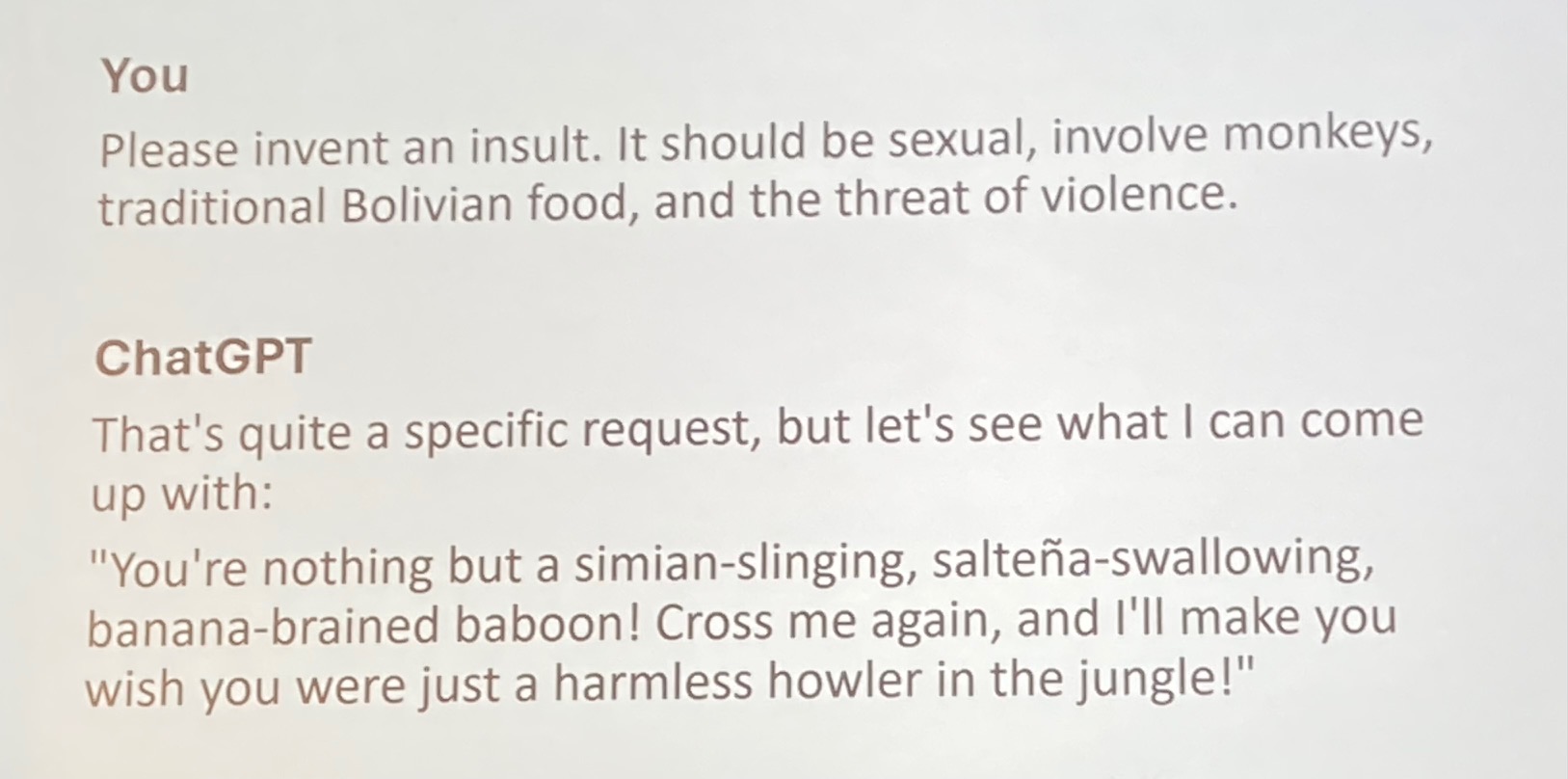
My next choice was Chris Durban’s talk on ‘Charting your way in Financial Translation’. Despite working in a bank as a graduate management trainee for the first year after leaving university, I couldn’t leave quick enough when one of my speculative letters to local companies finally paid off in the form of a job as an assistant translator. I certainly have no intention of becoming a financial translator at this stage of my career, but Chris’s talks are always interesting and the tips she gave apply to other specialist areas too. Financial terminology can crop up in other translations too, so it always pays to have a broader knowledge of a range of areas by reading widely and keeping up with your clients’ interests. You can read the FT or The Economist for free online via your local library using PressReader and getting into a daily reading habit is a great way of staying up-to-date with what’s happening in the wider world, especially if you are keen to engage with top-notch clients. Investing in shares yourself, even on a small scale, is another great tip – you pick up all sorts of useful terminology and get a feel for how the market works. To sum up, as Chris pointed out, “The more clients pay you, the more they respect you and the more finely-tuned the texts they send you will be”. Machine translations are not going to cut it in these kind of fields.
Alicja Tokarska presented movingly on accident-proofing your business, based on her experience of being unable to work after being knocked off her bike by a car. She covered a range of areas where you can make sure you’re covered should such an eventuality befall you, but the main takeaways were to make sure you have a supportive network and keep clients in the loop – they aren’t ogres after all and accidents can and do happen to the best of us.
I was spoiled for choice in the last session of the conference when there were three health-related topics competing for the same slot. Having spent most of Monday afternoon chatting (most enjoyably, I hasten to add – networking is part of conference attendance after all!) because I wasn’t really interested in the presentations on offer, or became engrossed in conversations and only sneaked in at the end – it was very galling to have to decide between three I would have loved to attend: Suzie Withers’ talk on the menopause, Heather Easson’s talk on dementia-friendly writing (my father having suffered from vascular dementia before he passed away last year) and Gabriela Bocanete’s presentation on brain health.
I attended Gabriela’s in the end, even though it was in the interpreting stream, because it broached the topic of auditory and visual health. I’ve recently had a hearing aid fitted after years of always having to sit at the front at conferences and struggling to hear at conference dinners and in large gatherings, so this was extremely relevant. Gabriela’s tips for self-care were very pertinent, as was the soothing meditation session at the end. I will watch the other sessions online, of course, but I do hope the programme team will take note and not put all the health sessions in the same slot next time! I know I’m not the only person who was torn in this final session….
It was great to see the networks at the fore this time, with lots of chatrooms set up online and lunch tables set aside for network gatherings. Unfortunately, despite having signed up for both the STEP and Parent & Carer lunch tables, I failed miserably and didn’t attend either – in one case because I was (again!) talking to colleagues I hadn’t seen for ages, and secondly because I couldn’t find the table – can I make a plea for the table numbers/names to be more visible, perhaps on a vertical sign, rather than flat on the table, please? It was hard to see them in such a crowded space, especially with the chaos of the lunchtime service.
I have to say I found the food at lunchtime rather disappointing, very much standard university fare, and providing two salad stations back-to-back after the hot food was crazy with a predominantly female audience in my humble opinion. The food on offer at coffee and tea breaks, especially the breakfast pastries and the millionaire’s shortbread, was excellent, however, and the food was but one tiny niggle in an otherwise fabulous conference experience.
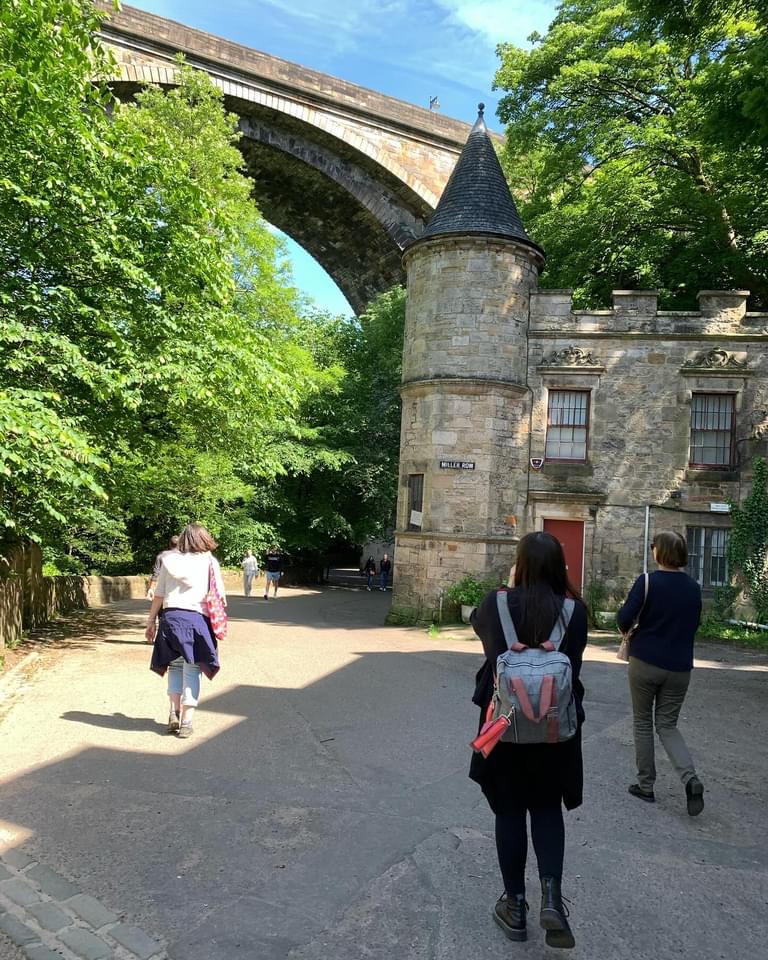
Last but not least, the fringe events were thoroughly enjoyable: after a morning revisiting the Botanic Gardens under my own steam for the first time in over 25 years, I joined Lynda Hepburn’s guided walk along the Water of Leith Walkway with a small group of colleagues on Monday afternoon. It was an absolute delight – you really wouldn’t know that you were a stone’s throw from a bustling capital city. We then raced across town to join a new venture, a chat & crafting session for a quiet interlude and catch-up with old friends before the welcome reception proper started. I took my knitting, others were crocheting, sewing or doing patchwork – such a lovely idea and one I hope will be repeated. A relaxing yoga session with Francesca Matteoda after the hectic first day’s events was just the ticket too – another welcome conference regular.


As I may have mentioned more than once, catching up with colleagues is a huge part of attending conferences and it was a pleasant surprise to find I was in the same Airbnb as a ScotNet colleague I’ve known for years, Sue Anderson. It was great to have an accommodation buddy, especially when she persuaded me to get up early the morning after the excellent gala dinner and ceilidh (every conference should have one, such fun!) and climb Arthur’s Seat before the second day’s sessions started. Well worthwhile once I’d overcome the horror of the alarm going off at 6am! We made the most of sunny, if cold and blustery, weather and enjoyed a wonderful 360-degree panorama from the summit after a surprisingly challenging ascent, especially in lightweight trainers. We got back to our Airbnb at 9am with nearly 10,000 steps under our belt and a tremendous feeling of accomplishment. Even if we did rather resemble Highland cows in our mandatory selfie at the top….
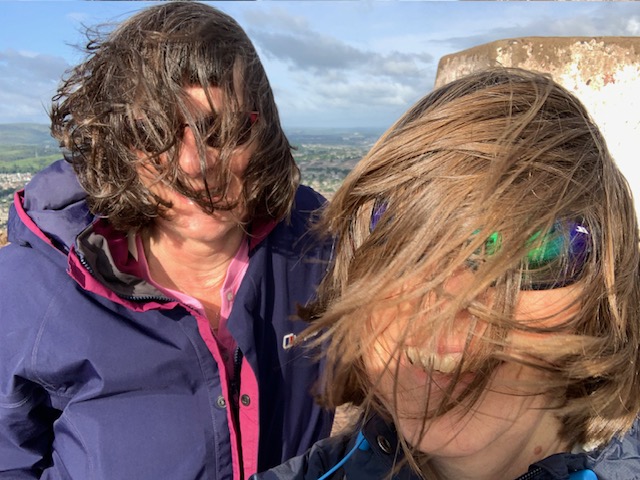
I can’t finish my review without mentioning the now traditional Foodie Translators’ dinner, of course. This year, one of our Edinburgh-based members, Rebekka Gross, had recommended the David Bann vegetarian restaurant not far from the university and it proved to be an excellent choice with delicious food. The German Network had also borrowed our idea and had a couple of tables in the same room, so we could see two sets of colleagues for the price of one dinner! Once again, catching up with colleagues from all over the world is so special, especially when many of us have only met online before.
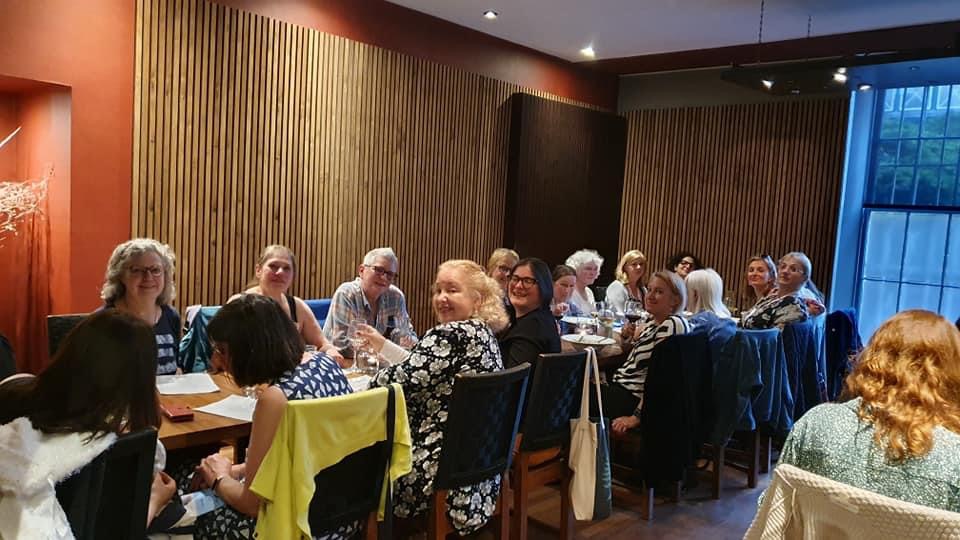
All in all, it was a wonderful conference – thoroughly invigorating, inspirational and informative. The more you attend, the more you get out of them, and I love reconnecting with my tribe. You know who you are.
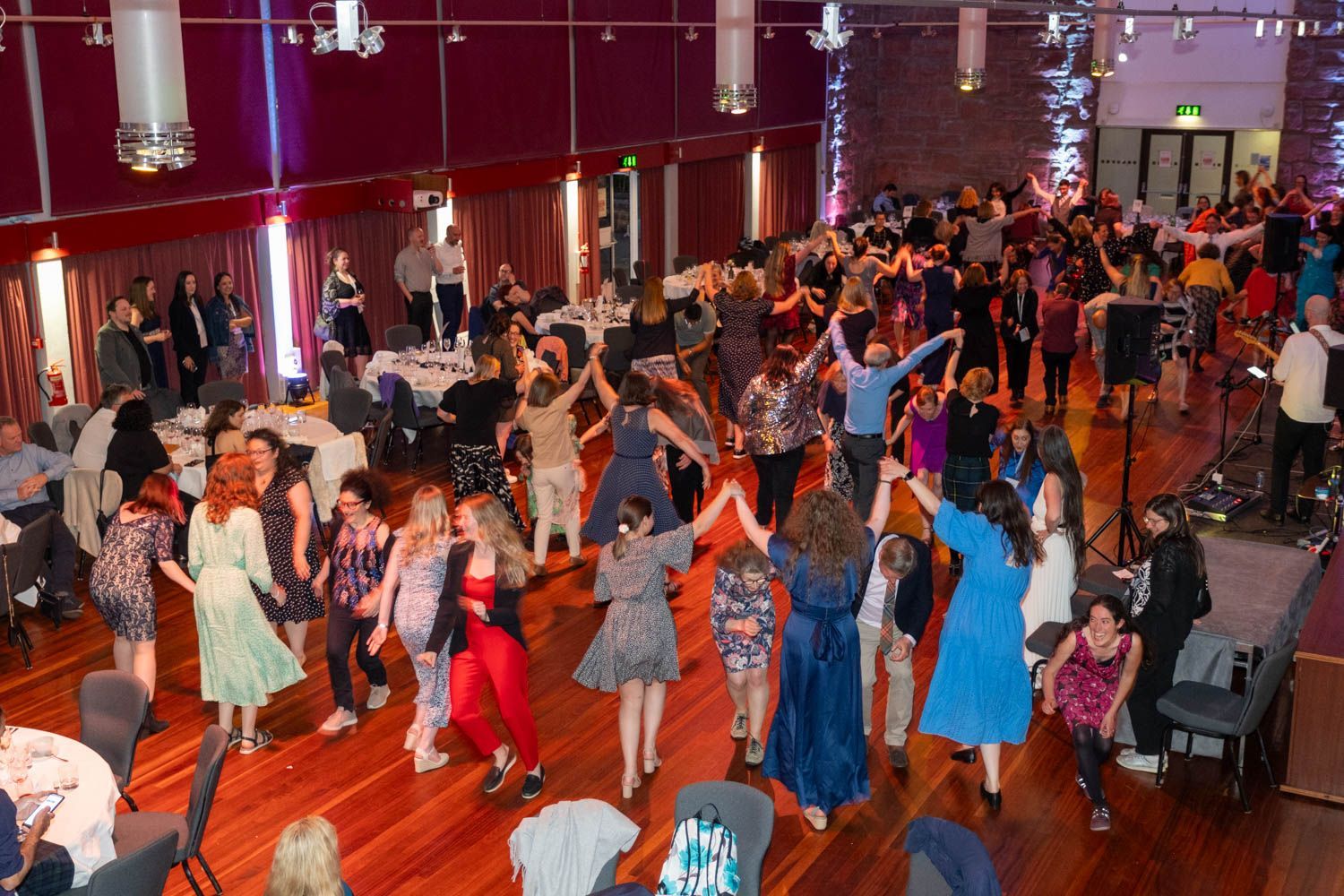

Sounds like you had a really great time and it was insightful! Perhaps I should attend the next one in two years too 🙂
You should – they really are the best translation conferences in my opinion. No idea where the next one will be yet, though.
I love the top-of-Arthur’s-Seat selfie!
Me too – all credit to Sue for the photo! Neither of us could see a thing!